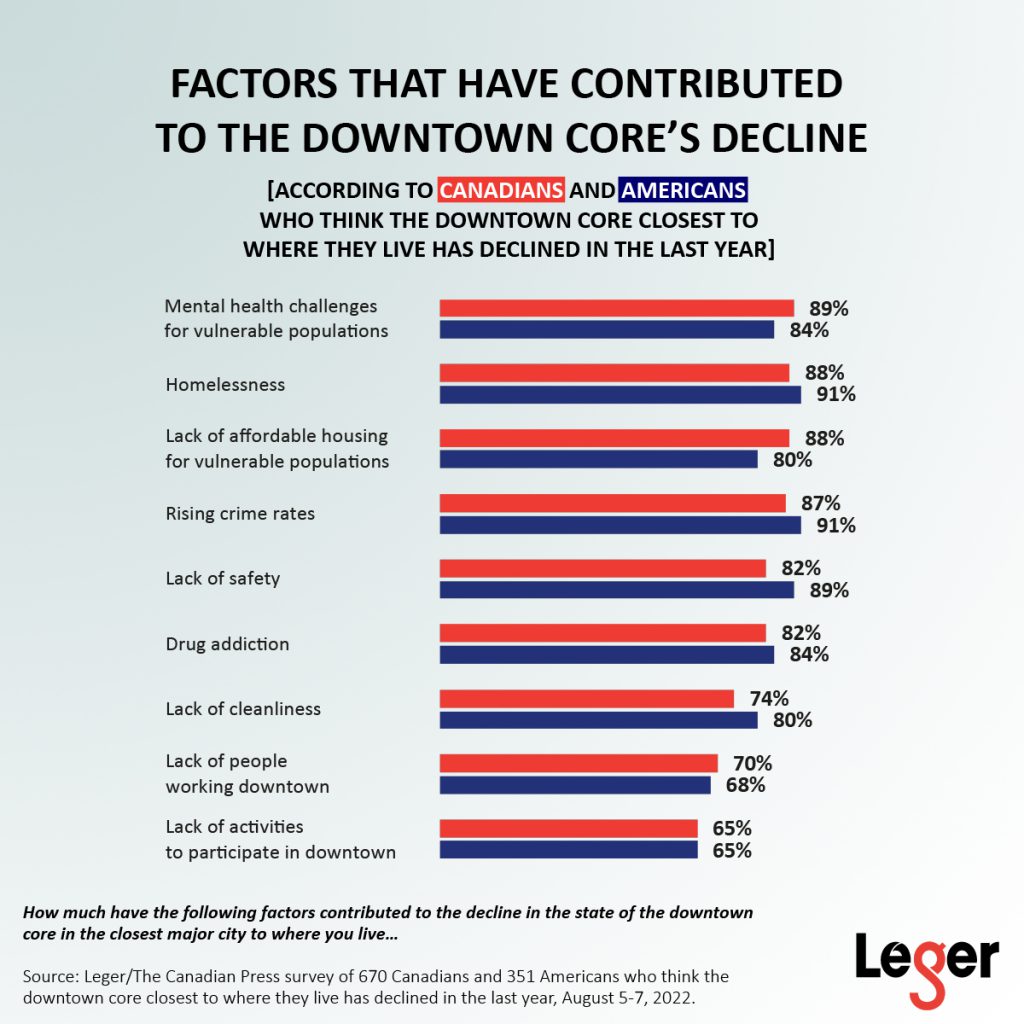THIS SURVEY EXPLORES CANADIANS’ AND AMERICANS’ PERSPECTIVES ON THE RETURN TO WORK AND WHETHER THE DOWNTOWN CORE NEAR WHERE THEY LIVE IS DECLINING.
Over halfway through 2022, Canadian and American employers and employees are continuing to grapple with regulations for the return to work. Should employees be required to return to work full time, and if they are, will they think about leaving? Our latest North American Tracker explored these questions.
We also explored Canadians’ and Americans’ perspectives about the state of the downtown core closest to where they live. In addition, we explored perceptions of safety: another important factor employers will need to consider if they mandate employees to return to work in person full time.
This survey is conducted in collaboration with the Association for Canadian Studies (ACS) and published in the Canadian Press. This series of surveys is available on Leger’s website.
Would you like to be the first to receive these results? Subscribe to our newsletter now.
RETURN TO WORK
- Employed Americans (37%) are more concerned than employed Canadians (29%) about losing their job in the next year.
- One-quarter of employed Canadians (24%) and employed Americans (25%) are likely to quit their job in the next year.
- If mandated to return to the office full-time in the near future*:
- 10% of Canadians and 12% of Americans say they would quit their job immediately
- 28% of Canadians and 25% of Americans say they would return to the office, but look for another job
*Among Canadians and Americans who work from home at least part of the time.
SITUATION IN THE DOWNTOWN CORES
- Canadians (45%) are more likely than Americans (31%) to indicate that the state of the downtown core closest to where they live has declined in the last year.
- 15% of Canadians and 18% of Americans say they or a close friend/family member have feared for their safety in the downtown core closest to where they live in the last 6 months.

METHODOLOGY
This web survey was conducted from August 5 to 7, 2022, with 1,509 Canadians and 1,002 Americans, 18 years of age or older, randomly recruited from LEO’s online panel.
A margin of error cannot be associated with a non-probability sample in a panel survey. For comparison, a probability sample of 1,509 respondents would have a margin of error of ±2.52%, 19 times out of 20, while a probability sample of 1,002 respondents would have a margin of error of ±3.09%, 19 times out of 20.
THIS REPORT CONTAINS THE RESULTS FOR THE FOLLOWING QUESTIONS AND MORE!
- How likely or unlikely are you to quit your current job in the next 12 months?
- If your employer mandated you to return to the office full-time in the very near future, would you…
- Over the past year, would you say the state of the downtown core of the closest major city to where you live has…
- How much have the following factors contributed to the decline in the state of the downtown core in the closest major city to where you live…
- Over the past six months, which of the following have you or a close friend or family member been a victim of in the downtown core of the closest major city to where you live? Select all that apply.
